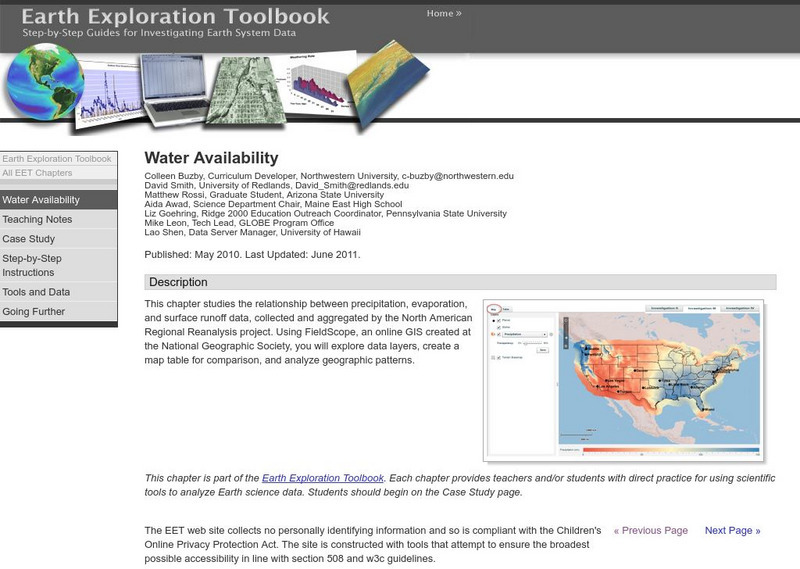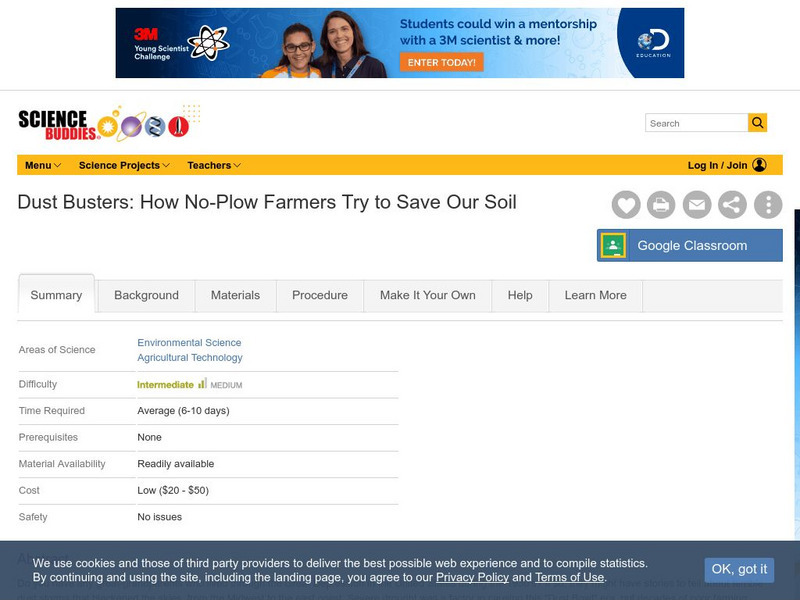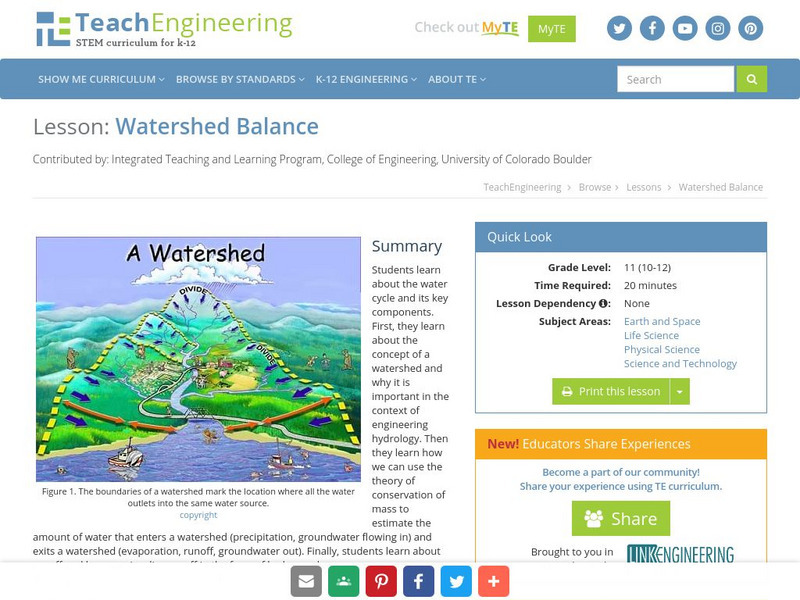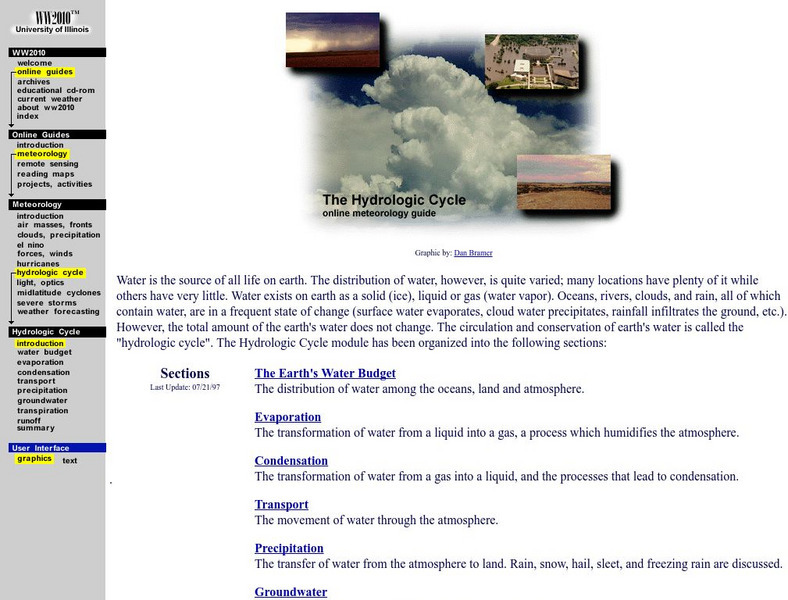Science Education Resource Center at Carleton College
Serc: Mn Step: Watershed: Exploring Run Off and Infiltration in the Classroom
A simple experiment that demonstrates how water is absorbed into soil and filtered through it, showing how water changes things in the environment. After a class demonstration, they will themselves investigate the effects of water...
CK-12 Foundation
Ck 12: Fourth Grade: Earth Science: Erosion and Deposition by Flowing Water
[Free Registration/Login may be required to access all resource tools.] Discusses how flowing water causes erosion; describes how runoff, streams, and rivers change Earth's surface; and identifies features caused by groundwater erosion.
Science Education Resource Center at Carleton College
Serc: Water Availability
This lesson helps young scholars discover the relationship between precipitation, evaporation, and surface runoff data. Using FieldScope, an online GIS created at the National Geographic Society, students will explore data layers, create...
Texas Instruments
Texas Instruments: Jason: Land Erosion Running Off With Soil
Rainforests at the Crossroads: Examine the relationship between rainfall and runoff on Barro Colorado Island (BCI) over a period of one year. Then examine the data and use the TI-73 Explorer to graph and analyze the values.
US Geological Survey
Usgs: Water Science for Schools Pesticides Ground Water
This US Geological Survey site briefly discusses the basics of why pesticides are increasingly found in our ground water. Click Home to access the site in Spanish.
Ministry of Education, Sports & Culture (Samoa) Government
Mesc: Samoa School Net: Rain and Water Cycle: Weather and Water Cycle
Explains the different stages in the water cycle while covering important vocabulary. Supported by lots of visuals and includes a good water cycle animation.
US Geological Survey
Usgs: Earth's Water: Lakes and Reservoirs
The USGS reviews the differences between lakes and reservoirs. They discuss the history of freshwater and salt water lakes. Click Home to access the site in Spanish.
Science Education Resource Center at Carleton College
Serc: Rain Erosion: Does the Rate of Water Effect Erosion?
In this lab, learners investigate whether the rate of water falling (rain) affects the amount of erosion (soil movement). This experiment could lead to further questions: how does grass or rocks effect soil erosion, does erosion lead to...
Alabama Learning Exchange
Alex: The Water Cycle
This is a hands applied lesson plan to help students experience the water cycle on a smaller scale. Because of the hands-on nature of the lesson plan, it works well to help students with a language barrier understand complicated vocabulary.
NOAA
Noaa: Ocean Facts on Runoff Pollution
Find out how water pollution can be prevented and how it affects you.
Other
North Carolina Department of Energy and Natural Resources: Water Puzzler
Solve the crossword puzzle and learn more about stormwater and runoff pollution.
Science Education Resource Center at Carleton College
Serc: Lab 7: Nitrates and Phosphates and Algae, Oh My!
A lab experiment, in a series of experiments, that investigates fisheries. In this lab, students test the effects of fertilizers and other pollutants on a model ecosystem. Students also examine 2 years of ocean color (chlorophyll...
Science Buddies
Science Buddies: Dust Busters: How No Plow Farmers Try to Save Our Soil
In this environmental science fair project, students will build models of fields prepared by plow-based and no-till methods, and see which ones are best at retaining soil moisture and preventing surface runoff.
NOAA
Noaa: National Ocean Service Education: Nonpoint Source Pollution
Illustrated tutorial explains nonpoint source pollution and its role in the health of the environment. Students learn about different sources of pollution and how these pollutants contaminate the land, air, and water. Click on the links...
Cosmo Learning
Cosmo Learning: Water Resources Engineering
A collection of video lectures from a course on water resources engineering. Webpage includes twenty-eight lectures from a professor at the National Programme on Technology Enhanced Learning. Lectures vary in length and cover topics like...
American Geosciences Institute
American Geosciences Institute: How Is Water Distributed?
See how the topography and gravity affect the distribution and flow of Earth's water.
Science Education Resource Center at Carleton College
Serc: Investigating Ponds and Streams: How Clean Is Our Water?
In this field lab, students investigate the differences in three city ponds. Students will compare pond life, temperature, pH, Ammonia, dissolved oxygen, and Nitrate. The student use the pond sheets (Flinn Scientific Catalog 2007) to...
Missouri Botanical Garden
Missouri Botanical Garden: The Water Cycle
This simple overview provides definitions of key terms in the water cycle and a diagram showing the path water takes in this cycle.
ClassFlow
Class Flow: Water Cycle
[Free Registration/Login Required] This is a science flipchart that reviews the stages of the water cycle and also ways in which the water cycle affects weather such as hurricanes and tornadoes.
Other
Nc Department of Energy and Natural Resources: What Is Stormwater Pollution
When it rains, some of the rainwater soaks into the ground, and part of it flows over the ground and directly into creeks, streams, or rivers. This water that runs off into the river is called runoff, or sometimes stormwater runoff....
Missouri Botanical Garden
Missouri Botanical Garden: Rivers and Streams
The Evergreen Project profiles the natural history of rivers and streams. Topics include watersheds, how a stream becomes a river, erosion, water pollution, and the like.
TeachEngineering
Teach Engineering: Watershed Balance
This lesson teaches the concept of a watershed and why it is important in the context of engineering hydrology. Learners learn about runoff and how we visualize runoff in the form of hydrographs.
University of Illinois
University of Illinois Urbana Champaign: The Hydrologic Cycle
Water is the source of life on earth. It exists in many forms and is constantly changing. The circulation and conservation of earth's water is called the hydrologic (or water) cycle. Find out how water evaporates, condensates,...
Curated OER
Clean Water
Information about the the first federal legislation to address pollution caused by stormwater runoff from the landscape.
Other popular searches
- Storm Water Runoff
- The Water Cycle Runoff
- Storm Water Runoff Cities
- Water Runoff Collection
- Water Runoff Cities



















